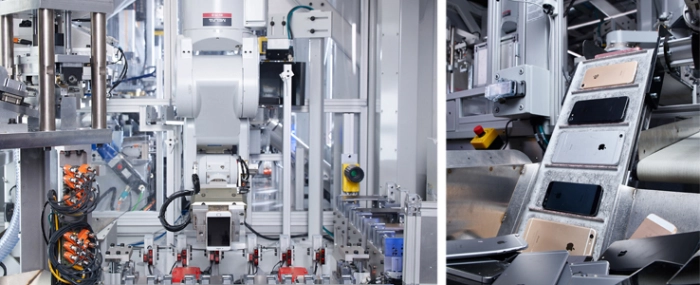
© Apple
General |
Apple grows Daisy project to create “closed loop”
In an effort to rely more heavily on recycled minerals stripped from used iPhones, Apple has announced plans to continue moving toward a “closed loop” manufacturing model that is less dependent on the mining industry for the procurement of needed minerals.
The shift to utilizing harvested minerals from used iPhones and recycling them for new products taps its robot, Daisy, as a key player. Daisy is designed to open, dismantle and strip out those parts of an iPhone that contain up to 14 different minerals. The chosen parts are then shipped to mineral recyclers. The robot is capable of breaking down 15 different iPhone models at the rate of 200 units per hour.
In a Reuters story this week, Apple was reportedly already using recycled tin, cobalt and rare earths in a handful of devices, with more to come. Last month, the company acquired its first commercial batch of carbon-free aluminum from a Rio Tinto (RIO.AX) and Alcoa (AA.N) collaboration.
Last April, Apple said that cobalt recovered through this process was being used to make brand-new Apple batteries — “a true closed loop for this precious material.”
As of April, the company had taken delivery of one million devices through Apple programs, with each Daisy able to disassemble 1.2 million devices per year. In 2018, the company said it had refurbished more than 7.8 million Apple devices, keeping more than 48,000 metric tons of electronic waste out of landfills.
The Silicon Valley-based company, whose closed-loop goals are thought of as unattainable by some in the industry, has at the same time acknowledged that the increasing worldwide demand for electronics means that directly-mined minerals will still be needed. With automotive and medical technology advancing rapidly, earth-sourced minerals will still be in hot demand – something that Apple has acknowledged.
According to the Reuters story, Apple would do well to focus on repair, rather than recycle and replace. That’s the opinion of Kyle Wiens, CEO of electronics repair firm iFixit: “There’s this ego that believes they can get all their minerals back, and it’s not possible.”
Apple’s Lisa Jackson, head of environment, policy and social initiatives, said, “We’re not necessarily competing with the folks who mine. There’s nothing for miners to fear in this development.”
The sentiment is shared by Tom Butler, president of the International Council on Mining and Minerals, who told Reuters, “Apple is in an enviable position, because they can do this. Not everyone else will be able to follow suit.”

